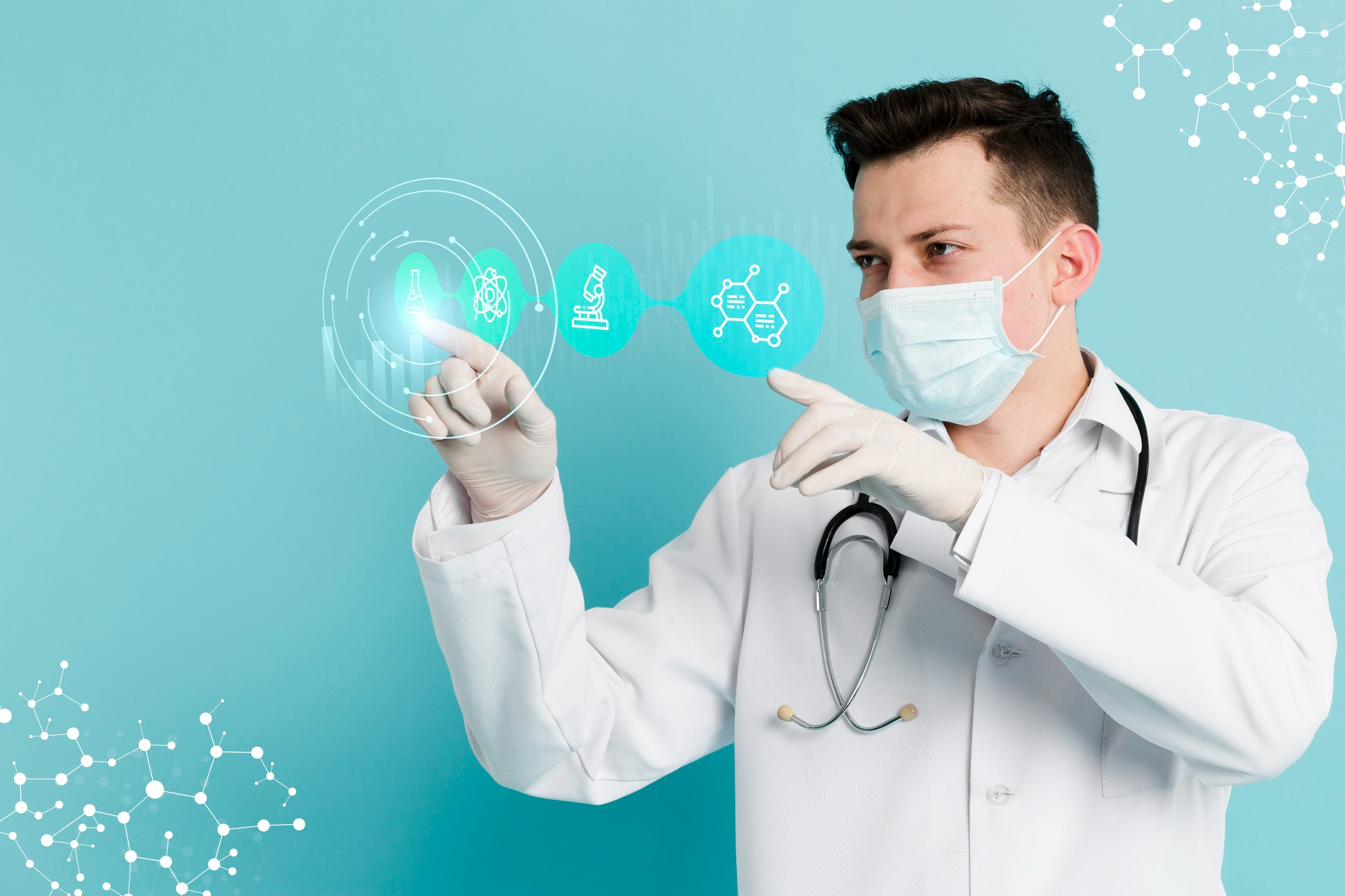
A doctor giving medicine to a person based on their past medical data.
Personalized medicine is a fresh and exciting technique to treat patients in the fast-paced world of healthcare. Personalized medicine, on the other hand, doesn't provide everyone the same care. Instead, it tailors care to each person's genetics, lifestyle, environment, and even the microbes that live in their body. This development is transforming how we stop, identify, and treat illnesses. This offers us hope for improved outcomes and a healthcare system that functions better. This blog article discusses customized medicine, its merits and downsides, and how it could affect health in the future. Whether you're interested in the latest medical developments or simply want to discover better methods to obtain treatment, read on to find out how customized medicine is altering healthcare.
There isn't just one technique to accomplish customized medicine, which is also known as precision medicine. But it is made to suit each individual. Genomics, big data analytics, and artificial intelligence (AI) are some of the tools that scientists employ to study a person's biological profile. Genetic testing may help physicians uncover particular mutations in illnesses like cancer and pick medicines that target those alterations instead of the typical ones.
The Human Genome Project, which finished in 2003 and mapped the full human DNA sequence, is one of the most significant things that has occurred to make medicine more individualized. This milestone demonstrated that genetic variations may influence an individual's susceptibility to illness and the efficacy of treatments. Next-generation sequencing (NGS) and other methods make it simple and inexpensive to sequence a genome. That implies that everyone can access information that is exclusive for them.
Pharmacogenomics is a key aspect of it. It studies how medications affect various individuals in different ways. For example, genetic markers may tell whether a person is likely to experience poor side effects from blood thinners like warfarin or antidepressants. Doctors might modify the dosage or use new medications after detecting these signs. This helps the medications work better and be safer.
Personalized medicine is highly useful for treating long-term health problems that are hard to fix. Here are some of the finest aspects about it:
Patients in traditional medicine sometimes have to go through a lot of therapies before they find one that works. This ambiguity isn't as big of a problem with personalized treatment. The American Society of Clinical Oncology states that targeted medicines, such imatinib for leukemia patients with particular genetic abnormalities, may make people live longer by up to 40%. When therapies are based on a person's DNA, the outcomes are more beneficial and simpler to forecast.
Genetic testing may tell you whether you are more likely to develop heart disease, high cholesterol, or high blood pressure. People with specific gene variations, such as APOE, may perform better on diets or drugs that are developed for them. For instance, statins lessen the chance of having a stroke or heart attack.
Genetic testing may cost money initially, but it will save you money in the long term. The National Institutes of Health (NIH) states that poor medication responses cost the health care system billions of dollars per year. Personalized medicine deals with these problems by making sure that the proper treatment and dosage are administered from the beginning. Combining genetic information with continuous glucose monitoring may improve insulin treatment and lower the number of hospital visits for diabetes-related issues like low blood sugar.
In regions like certain sections of India where there aren't many resources, individualized techniques may assist make sure that the cheapest therapies are implemented first. Genetic testing for common disorders like thalassemia may help individuals remain healthy and save money on treatments that last a lifetime.

Digital health tools to create tailored treatments that improve outcomes for every individual.
Personalized medication is quite good at preventing individuals from becoming ill in the first place. Genetic risk assessments can tell you years before someone becomes ill whether or not they are likely to have Alzheimer's or breast cancer. For example, changes in the BRCA1 and BRCA2 genes make it more likely that you may acquire breast or ovarian cancer. The World Health Organization (WHO) notes that individuals who have the condition may opt to have further testing or do activities to keep healthy.
Epigenetics is extremely essential since it studies how nutrition and stress alter how genes operate. You may use these guidelines to develop health programs that are unique for you. You can also try diets like the Mediterranean or low-carb diet to lessen your chance of having diabetes or autoimmune illnesses.
When people adopt customized medicine, they are in command of their own treatment. Wearable tech and health applications can tell you how active you are right now, how much sleep you're getting, and how quickly your heart is pounding. You may use this and genetic information to build treatment regimens that evolve as time goes on. For example, a device that can determine when your heart beats out of rhythm may lead to a genetic test that suggests you are likely to develop atrial fibrillation. This could lead to early treatment.
Health portals let patients access their genetic findings and speak to doctors online. People are more likely to follow their treatment programs and take care of their own health when they are honest.
Personalized medicine is already making a difference in a lot of areas of medicine. Genetic profiling of tumors in cancer research makes it feasible to use tailored medicines. For instance, a lung cancer patient with an EGFR mutation could receive osimertinib instead of chemotherapy that works on a variety of different types of cancer. Osimertinib makes tumors smaller with minor negative effects.
Neurology is redefining how epilepsy is treated by adopting strategies that are unique to each individual. Genetic testing may discover alterations in genes that control sodium channels. This information may help physicians figure out which medications will work best to halt seizures. A research published in 2020 in the Journal of the American Medical Association (JAMA) indicated that pharmacogenomic-guided medication lowered the incidence of seizures in persons who didn't respond to existing therapies by half.
Diseases that spread by contact also become better. By studying how genetics impact immune responses, we were able to make confident projections about what might happen during the COVID-19 pandemic. In the future, vaccinations may be designed to optimize efficacy with certain HLA genes that regulate immune system function.
Personalized medicine has a lot of potential, but it also has certain issues. Data privacy is particularly crucial since genetic information is incredibly private. The Digital Personal Data Protection Act of 2023 is in effect in India, while the General Data Protection Regulation (GDPR) is in effect all over the globe. These two sets of restrictions are meant to protect sensitive data, yet it still gets hacked. You must perform all testing on systems that are encrypted and with the patient's full awareness.
Access is another problem, particularly in places where there aren't many resources. It might be challenging to access specialized diagnostic laboratories in remote locations, but mobile health units and telemedicine are helping to meet this demand. Cost is another problem, although genetic sequencing is growing cheaper, so it is becoming more accessible. You may now obtain tailored panels for as low as $100.
There should be strong standards to cope with moral difficulties, such the possibility of genetic discrimination in employment or insurance. The UN and other international bodies want everyone to be able to receive genetic information in a fair manner so that it doesn't be exploited for evil reasons. It might be challenging to grasp the findings when certain genetic variations don't have obvious implications. Genetic counselors are incredibly beneficial for those who don't know these facts.
Technology is growing better, which is good news for the future of individualized treatment. AI and machine learning use a lot of data to make better projections about how probable it is that someone will become sick and how effectively therapy will work. AI models can utilize information about genetics, lifestyle, and the environment to predict how diabetes will develop worse. This helps individuals start treatment sooner.

A doctor giving medicine to a person based on their past medical data.
CRISPR gene editing might help address genetic issues, but it's still new and not utilized in a lot of clinics. Genetic knowledge regarding neurotransmitter circuits might help antidepressants operate better for each individual. This would help millions of individuals who have to go through a lot of trial and error.
Genetic databases that are exclusively for particular groups of individuals are beginning to show up to show how different people are throughout the globe. Localized data would help physicians deliver better treatment in regions like India, where illnesses like TB and thalassemia are endemic. You may adjust therapy straight immediately when you employ wearable technology and electronic health records (EHRs) together. This will make the experience smoother and more focused on the patient.
Personalized medicine is the dawn of a new age in which each patient receives a therapy that is different from everyone else's. By concentrating on prevention, accuracy, and giving patients more authority, it promises improved health outcomes and a healthcare system that lasts longer. Talk to your doctor about genetic testing or wellness programs that are tailored particularly for you if you want to know more about how customized medicine may assist you. Personalized medicine is the future, and it's already here.
We offer expert care across key specialties, including Medicine, Cardiology, Orthopaedics, ENT, Gynaecology, and more—delivering trusted treatment under one roof.
Prakash Hospital Pvt. Ltd. is a 100 bedded NABH NABL accredited multispecialty hospital along with a center of trauma and orthopedics. We are in the service of society since 2001.
OUR SPECIALITIES
Contact Us
D – 12A, 12B, Sector-33, G. B. Nagar, Noida, Uttar Pradesh 201301
+91-8826000033

© 2026 All rights reserved.
Designed and Developed by Zarle Infotech